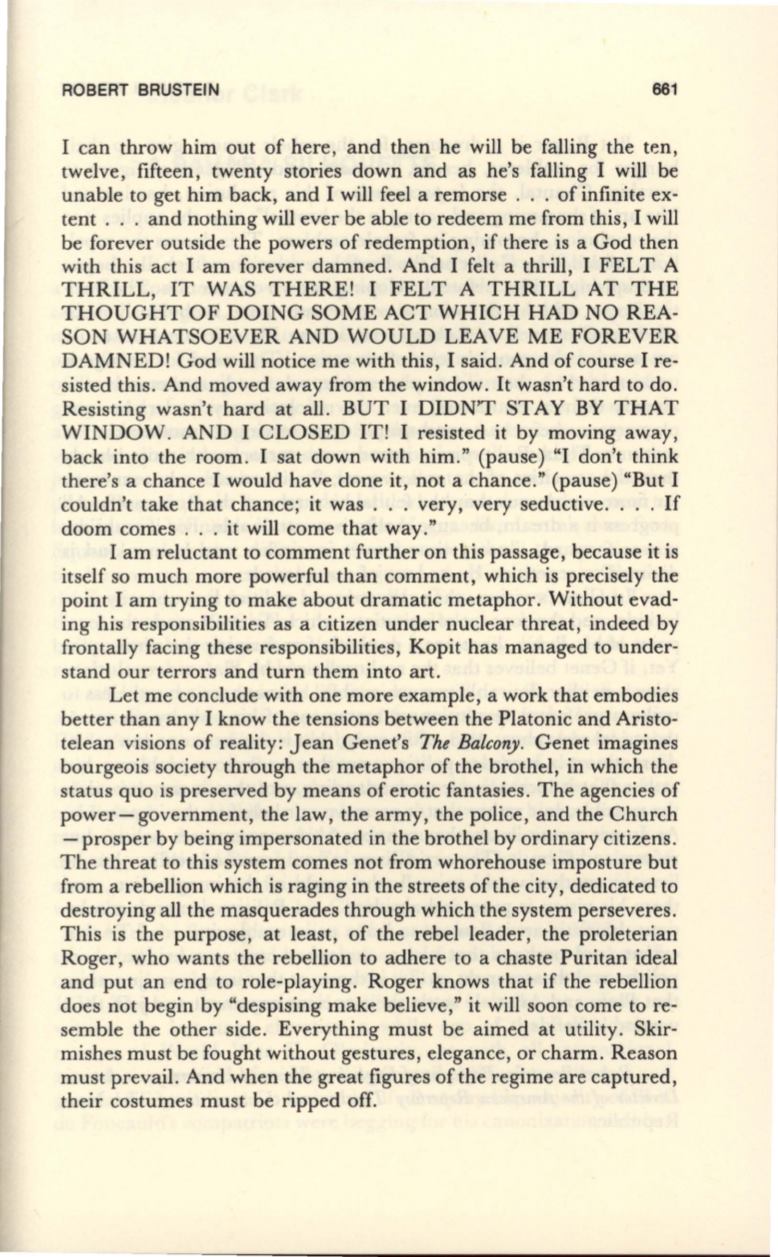
ROBERT BRUSTEIN
661
I can throw him out of here, and then he will be falling the ten,
twelve, fifteen, twenty stories down and as he's falling I will be
unable to get him back, and I will feel a remorse . . . of infinite ex–
tent ... and nothing will ever be able to redeem me from this, I will
be forever outside the powers of redemption, if there is a God then
with this act I am forever damned. And I felt a thrill, I FELT A
THRILL, IT WAS THERE! I FELT A THRILL AT THE
THOUGHT OF DOING SOME ACT WHICH HAD NO REA–
SON WHATSOEVER AND WOULD LEAVE ME FOREVER
DAMNED! God will notice me with this, I said. And of course Ire–
sisted this. And moved away from the window. It wasn't hard to do.
Resisting wasn't hard at all. BUT I DIDN'T STAY BY THAT
WINDOW. AND I CLOSED IT! I resisted it by moving away,
back into the room. I sat down with him." (pause) "I don't think
there's a chance I would have done it, not a chance." (pause) "But I
couldn't take that chance; it was ... very, very seductive....
If
doom comes . . . it will come that way."
I am reluctant to comment further on this passage, because it is
itself so much more powerful than comment, which is precisely the
point I am trying to make about dramatic metaphor. Without evad–
ing his responsibilities as a citizen under nuclear threat, indeed by
frontally facing these responsibilities, Kopit has managed to under–
stand our terrors and turn them into art.
Let me conclude with one more example, a work that embodies
better than any I know the tensions between the Platonic and Aristo–
telean visions of reality: Jean Genet's
The Balcony.
Genet imagines
bourgeois society through the metaphor of the brothel, in which the
status quo is preserved by means of erotic fantasies. The agencies of
power-government, the law, the army, the police, and the Church
-prosper by being impersonated in the brothel by ordinary citizens.
The threat to this system comes not from whorehouse imposture but
from a rebellion which is raging in the streets of the city, dedicated to
destroying all the masquerades through which the system perseveres.
This is the purpose, at least, of the rebel leader, the proleterian
Roger, who wants the rebellion to adhere to a chaste Puritan ideal
and put an end to role-playing. Roger knows that if the rebellion
does not begin by "despising make believe," it will soon come tore–
semble the other side. Everything must be aimed at utility. Skir–
mishes must be fought without gestures, elegance, or charm. Reason
must prevail. And when the great figures of the regime are captured,
their costumes must be ripped off.


